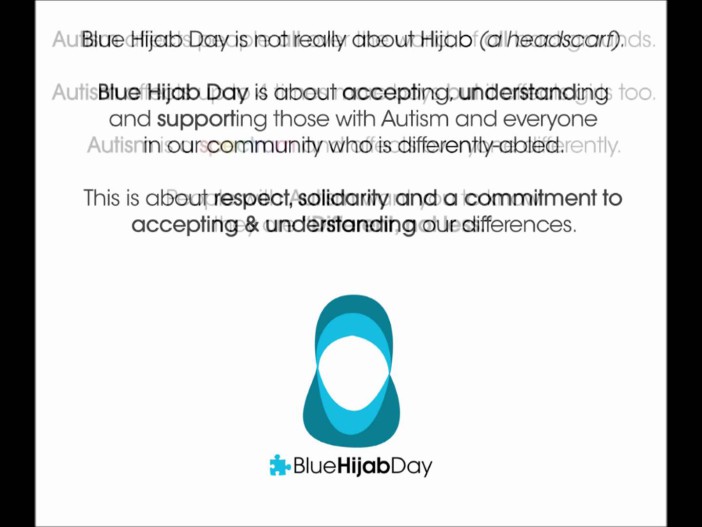South Africans are encouraged to wear a blue scarf for Blue Hijab Day on Thursday 2nd April in support of World Autism Day. Locally, the initiative is being organized by Planet Mercy, a non-profit organisation started by the renowned Shaykh Yaghya al Ninowy, the founder of the Madina Institute. The campaign aims to create awareness on the challenges of autism and create a support system for children with autism. Supporters can wear anything in blue, to show their solidarity with autism sufferers.
“We want people to talk about autism and participate in awareness efforts. Learn more about autism. Organise a Blue Hijab Day event in your community and if you know someone with autism, find out if there’s any way you can help them,” says Noorjehan Allie, a psychology student who tutors autistic kids.
Autism spectrum disorder (ASD) and autism are both general terms for a group of complex disorders of brain development. These disorders are characterized, in varying degrees, by difficulties in social interaction, verbal and nonverbal communication and repetitive behaviours.
With the May 2013 publication of the DSM-5 diagnostic manual, all autism disorders were merged into one umbrella diagnosis of ASD. Previously, they were recognized as distinct subtypes, including autistic disorder, childhood disintegrative disorder, pervasive developmental disorder-not otherwise specified (PDD-NOS) and Asperger syndrome.
ASD can be associated with intellectual disability, difficulties in motor coordination and attention and physical health issues such as sleep and gastrointestinal disturbances. Some persons with ASD excel in visual skills, music, math and art.
Autism appears to have its roots in very early brain development. However, the most obvious signs of autism and symptoms of autism tend to emerge between 2 and 3 years of age. Autism Speaks, for example, funds research on effective methods for earlier diagnosis, as early intervention with proven behavioral therapies can improve outcomes. Increasing autism awareness is a key aspect of this work and one in which our families and volunteers play an invaluable role.
Autism is a lifelong, complex condition that occurs as a result of disordered brain growth, structure and development believed to stem from a genetic predisposition triggered by environmental factors, affecting 4-5 times more boys than girls.
In South Africa, one in every 88 children are autistic. Autism has increased by 500% over the past 5 yrs, and at least 10 new cases are identified weekly in the Western Cape alone. There are currently only 6 Public schools catering for children with autism in SA, meaning that thousands of Autistic children are not receiving the benefit of specialised intervention.
In Cape Town, a Dhikr will be held after Maghrib on Thursday at Masjidul-Quds and Masjidul Karaar and a ladies-only dhikr on Friday at 6pm at Masjidul-Quds. VOC






 WhatsApp us
WhatsApp us 

